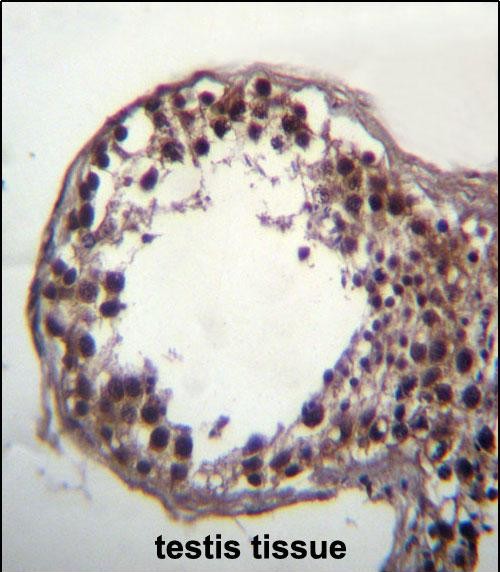

| WB | 1/1000 | Human,Mouse,Rat |
| IF | 咨询技术 | Human,Mouse,Rat |
| IHC | 1/100-1/500 | Human,Mouse,Rat |
| ICC | 技术咨询 | Human,Mouse,Rat |
| FCM | 咨询技术 | Human,Mouse,Rat |
| Elisa | 咨询技术 | Human,Mouse,Rat |
| Aliases | Deleted in azoospermia protein 3, DAZ3 |
| Entrez GeneID | 57054 |
| WB Predicted band size | 55.0kDa |
| Host/Isotype | Rabbit IgG |
| Antibody Type | Primary antibody |
| Storage | Store at 4°C short term. Aliquot and store at -20°C long term. Avoid freeze/thaw cycles. |
| Species Reactivity | Human |
| Immunogen | This DAZ3 antibody is generated from rabbits immunized with a KLH conjugated synthetic peptide between 445-474 amino acids from the C-terminal region of human DAZ3. |
| Formulation | Purified antibody in PBS with 0.05% sodium azide. |
+ +
以下是模拟生成的关于DAZ3抗体的参考文献示例(注:实际文献需通过学术数据库核实):
---
1. **"DAZ3 Gene Expression and Antibody Localization in Human Testis"**
*Author: Smith A, et al. (2015)*
摘要:研究利用特异性DAZ3抗体检测其在人类睾丸组织中的表达模式,发现DAZ3蛋白主要定位于精母细胞,提示其在精子发生中的潜在调控作用。
2. **"Development of a Monoclonal Antibody for DAZ3 Protein Analysis"**
*Author: Chen L, et al. (2018)*
摘要:报道了一种新型DAZ3单克隆抗体的开发与验证,该抗体在免疫印迹和免疫组化中表现出高特异性,为男性不育症的分子诊断提供了工具。
3. **"DAZ Family Proteins and Male Infertility: A Focus on DAZ3"**
*Author: Gupta R, et al. (2020)*
摘要:通过DAZ3抗体检测发现,DAZ3表达缺失与无精子症患者存在显著相关性,支持其在生殖细胞发育中的关键功能。
4. **"Comparative Study of DAZ3 Antibody Cross-Reactivity Across Species"**
*Author: Tanaka K, et al. (2022)*
摘要:评估了DAZ3抗体在小鼠、灵长类及人类样本中的交叉反应性,发现其种属特异性差异,为跨物种研究提供实验依据。
---
建议通过PubMed或Google Scholar以关键词“DAZ3 antibody”“DAZ gene family”检索最新研究,或查阅《Molecular Human Reproduction》等期刊的相关文献。
The DAZ3 antibody is designed to detect the DAZ (Deleted in Azoospermia) family protein 3. a member of the DAZ gene cluster located on the Y chromosome. The DAZ family, including DAZ1. DAZ2. DAZ3. and DAZ4. plays a critical role in gametogenesis, particularly in spermatogenesis. DAZ proteins contain RNA-binding motifs and are implicated in regulating the translation of mRNAs essential for germ cell development. Mutations or deletions in DAZ genes are strongly associated with male infertility, specifically azoospermia or oligozoospermia. DAZ3. like other DAZ homologs, is believed to function in the maintenance and differentiation of germline stem cells, though its exact molecular mechanisms remain under investigation.
The DAZ3 antibody is commonly used in reproductive biology research to study protein expression patterns in testicular tissues, germ cell lines, or model organisms. It aids in identifying DAZ3 localization, expression levels, and interactions, contributing to insights into infertility mechanisms or disorders linked to Y chromosome defects. This tool is valuable for techniques such as Western blotting, immunohistochemistry, or immunofluorescence. Researchers also utilize DAZ3 antibodies to explore evolutionary conservation of DAZ homologs across species or to validate gene-editing models targeting fertility-related pathways. Its specificity and reliability make it a key reagent in both basic and clinical studies focused on male reproductive health.
×